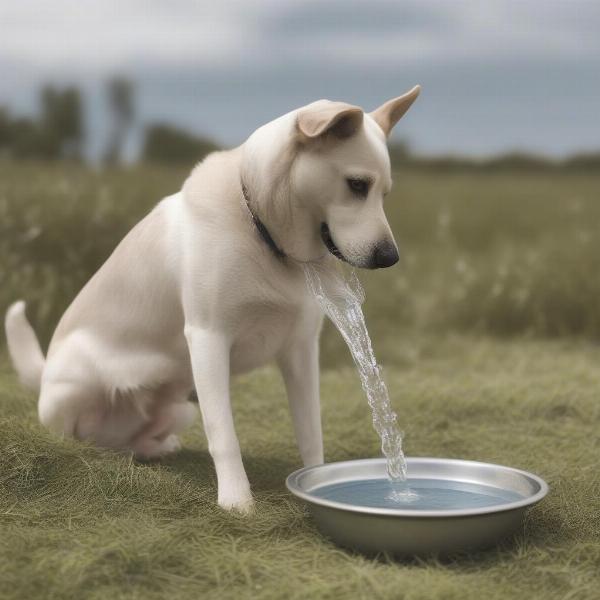Is grass fertilizer bad for dogs? This is a common concern for pet owners who want a lush, green lawn but also prioritize their furry friend’s safety. While a perfectly manicured lawn can be aesthetically pleasing, certain fertilizers can pose health risks to our canine companions. Understanding the potential dangers and taking appropriate precautions is essential for maintaining both a beautiful yard and a healthy dog.
Understanding the Risks of Fertilizer for Dogs
Fertilizers, while beneficial for plant growth, often contain chemicals like nitrogen, phosphorus, and potassium that can be harmful to dogs if ingested. The level of toxicity varies depending on the type of fertilizer, the amount consumed, and the size and health of the dog. Symptoms of fertilizer poisoning can range from mild gastrointestinal upset (vomiting, diarrhea) to more serious issues like tremors, seizures, and even death in severe cases.
Types of Fertilizer and Their Risks
Different types of fertilizers pose different levels of risk. Granular fertilizers, with their small, appealing pellets, can be particularly attractive to dogs. These can cause irritation to the mouth and digestive tract if ingested. Liquid fertilizers, while less enticing, can also be harmful if lapped up by a thirsty dog. Organic fertilizers are generally considered safer, but it’s important to check the ingredients, as some can still contain potentially harmful substances.
Signs of Fertilizer Poisoning in Dogs
Recognizing the signs of fertilizer poisoning is crucial for timely intervention. If your dog exhibits symptoms like vomiting, diarrhea, excessive drooling, difficulty breathing, lethargy, or muscle tremors after potential exposure to fertilizer, contact your veterinarian immediately.
Protecting Your Dog from Fertilizer
Protecting your dog from the potential dangers of fertilizer involves a combination of preventative measures and responsible lawn care practices. Following these steps can significantly reduce the risk of exposure:
-
Keep your dog away from the lawn after fertilizing: Follow the manufacturer’s instructions regarding the recommended waiting period before allowing pets back onto the treated area. This allows the fertilizer to absorb into the soil, minimizing the risk of ingestion.
-
Water the lawn thoroughly: Watering the lawn after applying fertilizer helps dilute the chemicals and further reduces the chance of your dog coming into contact with concentrated amounts.
-
Choose pet-friendly fertilizers: Opt for organic fertilizers or those specifically labeled as safe for pets. These typically contain natural ingredients and avoid harsh chemicals that can harm dogs.
-
Store fertilizers securely: Store fertilizers in a locked cabinet or area inaccessible to your dog. This prevents accidental ingestion, especially if your dog is prone to exploring or chewing on things.
What to Do If Your Dog Ingests Fertilizer
If you suspect your dog has ingested fertilizer, seek immediate veterinary care. Do not induce vomiting unless instructed by a veterinarian, as this can sometimes worsen the situation. Provide your vet with information about the type of fertilizer and the estimated amount ingested.
 Dog drinking water from a bowl
Dog drinking water from a bowl
Conclusion
While a green lawn enhances the beauty of your home, your dog’s safety should always be the priority. By understanding the potential dangers of fertilizers and taking preventative measures, you can create a safe and enjoyable environment for both your pet and your plants. Remember to choose pet-friendly options, follow the manufacturer’s instructions carefully, and seek immediate veterinary attention if you suspect fertilizer poisoning.
FAQ
-
What is the most common type of fertilizer poisoning in dogs? Ingestion of granular fertilizers is a common cause of poisoning due to their appealing size and shape.
-
Can organic fertilizers harm dogs? While generally safer, some organic fertilizers can still contain ingredients that may be harmful to dogs if ingested in large quantities. Always check the label.
-
How long should I keep my dog off the lawn after fertilizing? Follow the manufacturer’s recommendations, which can vary depending on the product. Generally, 24-72 hours is advisable.
-
What are the first signs of fertilizer poisoning in dogs? Vomiting, diarrhea, excessive drooling, lethargy, and difficulty breathing are some common initial signs.
-
What should I do if my dog ingests fertilizer? Contact your veterinarian immediately and provide them with details about the fertilizer and the amount ingested.
Related Articles on ILM Dog
About ILM Dog
ILM Dog (ilmdog.com) is your trusted source for expert advice on all aspects of dog care, from breed selection and puppy care to senior dog health and training. We provide practical, reliable information to help dog owners worldwide create a happy and healthy life for their furry companions. We cover a range of topics including health and medical care, nutrition, grooming, and product recommendations. Our expert guidance ensures your pet receives the best possible care. For further assistance, contact us at [email protected] or +44 20-3965-8624.